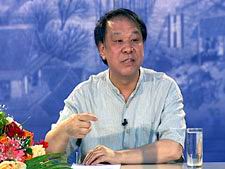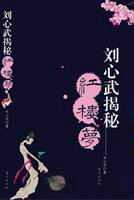|
Talkshow revives craze for 'Dream of Red Chambers'
(Xinhua)
Updated: 2005-11-09 09:23
A mid-day talkshow on China's best-known romance recently aroused new craze
among fashionable young people.

Full-time writer
Liu Xinwu hosts a talkshow program on the novel "Dream of Red Chambers" on
CCTV. [baidu] | China Central Television (CCTV),
or the state-owned broadcast company, aired more than 10 episodes of the series,
in which modern novelist Liu Xinwu makes comments on the 200-year-old romance,
the Dream of Red Chambers written by Cao Xueqin in the Qing Dynasty (1644-1911),
a unanimously-acclaimed best Chinese classic novel.
At TV broadcasts, Liu, a full-time writer, offered his new interpretations
for the romance on the basis of his decade-long research.
Defying many classical aesthetic tastes for the great book, Liusaid its
author combined all events and figures at his time into the novel and used
characters and scenarios to replay such environs.
His brave interpretation immediately intrigued a large number of TV viewers.
A new publication of the talkshow transcripts, compiled by market-sensitive book
agents, was soon to be put onto the top five best-sellers in many big bookstores
in Beijing.
The novel was seriously criticized at the Cultural Revolution (1966-1976) as
an obscene book eroding "revolutionary willpower" of young people. Actually
there were only some flirtations and exchanges of romantic lyrics among
youngsters of big noble families.
China saw the last revival of the book in the late 1970s when the ten-year
turmoil just ended. Never sparing one look at many classical novels, including
the Dream of Red Chambers, young people today bury their energy and wisdom in
piles of Japanese manga books and Play-Station Portables.

A book of Liu's program is popular among
readers in China, retrieving a new infatuation over the
"Dream of Red Chambers." [baidu] | As Liu's brave
comments encouraged the young to pick up the hefty novel for the first time,
many austere scholars for the Dream of Red Chambers charged Liu with his
discretionary interpretation.
"Liu's approach is more like riddle-solving, or tracing linkage between the
novel's events and characters and those of the real life at that time, " wrote a
critic in a column at the Beijing News.
"He, like a detective, interprets the book by setting one suspense after
another," the critic said. "That's the reason why it's so intriguing and popular
among TV viewers."
Hu Wenbin, vice president of the Chinese Society for the Dream of Red
Chambers Society, said in an interview, "The talkshow can be misleading."
He argued that any responsible research needs to be based on real historical
proof rather than imagination.
"One man's afterthoughts, though interesting, is never equivalent to academic
research," Hu said, "to interpret the novelis not to play a guessing game."
However, Hu said he welcomes the great attention paid to the classical novel
after the talkshow broadcast.
Liu, who describes himself only as a buff for the book, humbly responded to
the criticism. "I will take any criticism if it's objective," He said.
But he also pleaded for more academic freedom for people outside the academia
like him. "Interpretation of the book is a public sphere and can not be the
monopoly of a small number of scholars." he insisted.
|